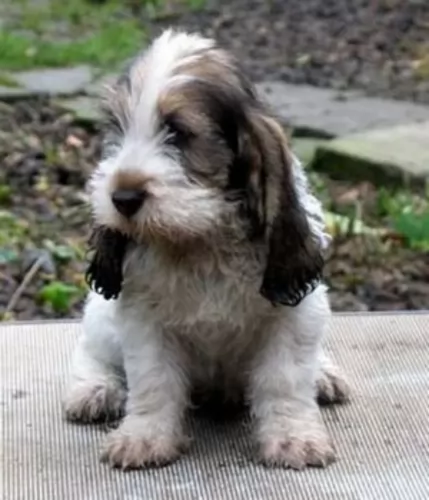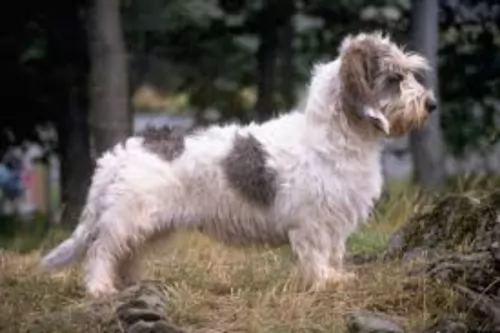 Petzlover
Petzlover Petit Basset Griffon Vendeen is originated from France but Telomian is originated from Malaysia. Petit Basset Griffon Vendeen may grow 8 cm / 3 inches shorter than Telomian. Petit Basset Griffon Vendeen may weigh 7 kg / 16 pounds more than Telomian. Both Petit Basset Griffon Vendeen and Telomian has same life span. Both Petit Basset Griffon Vendeen and Telomian has almost same litter size. Both Petit Basset Griffon Vendeen and Telomian requires Moderate Maintenance.
Petit Basset Griffon Vendeen is originated from France but Telomian is originated from Malaysia. Petit Basset Griffon Vendeen may grow 8 cm / 3 inches shorter than Telomian. Petit Basset Griffon Vendeen may weigh 7 kg / 16 pounds more than Telomian. Both Petit Basset Griffon Vendeen and Telomian has same life span. Both Petit Basset Griffon Vendeen and Telomian has almost same litter size. Both Petit Basset Griffon Vendeen and Telomian requires Moderate Maintenance.
 The Petit Basset Griffon Vendéen hails from France. They have always been used to hunt game by scent. This dog has always been appreciated for its independence and the fact that is is mentally focused and fit.
The Petit Basset Griffon Vendéen hails from France. They have always been used to hunt game by scent. This dog has always been appreciated for its independence and the fact that is is mentally focused and fit.
These dogs, referred to as the PBGV descend from the larger Griffon Vendeen, which comes in four distinct sizes. The first official French standard for this dog was published in 1898. It was in 1909 that a revised standard for the dog recognized two distinct varieties.
The first PBGVs were imported to the United States in 1983 and the Petit Basset Griffon Vendeen Club of America was founded in 1984.
 The Telomian, out of Malaysia is rare and the only dog bred in Malaysia that lives outside the country. The breed was originally called Village dog or Anjing Kampung in Malay. The Telo is still considered one of the rarest dogs in the world. They are considered as a possible missing link between the Australian Dingo and the African Basenji.
The Telomian, out of Malaysia is rare and the only dog bred in Malaysia that lives outside the country. The breed was originally called Village dog or Anjing Kampung in Malay. The Telo is still considered one of the rarest dogs in the world. They are considered as a possible missing link between the Australian Dingo and the African Basenji.
They were bred to kill vermin by indigenous people, the Orang Asli of Malasia. They have an amazing ability to climb bred into them because these indigenous people lived in stilt houses. Even as they kept the Theomian to hunt vermian, the Orang Asli believed dogs were evil spirits who would eventually turn on them.
In 1963, Dr. Orville Elliot, an anthropologist from the West, discovered the breed and named them the Telomian for the Telom River they lived near. He took a pair to the United States and by 1970 there was a Telomian Dog Club in the U.S. By 1973 another pair had been imported and it is thought that all the Telomians who live in the United States today are descendants of these two pairs.
Like the New Guinea Singing Dog and the Basenji, the Telo do not bark but rather have a unique howl. Being bred from wild dogs, the Telo is not fully domesticate and puppies need a lot of socialization. The Telomian is on the Dog Registry of America Inc and America’s Pet Registry but is not recognized by any pedigree registry.
 Both male and female dogs are much the same in size, standing at between 32 and 40cm and weighing between 15 to 20 kilograms.
Both male and female dogs are much the same in size, standing at between 32 and 40cm and weighing between 15 to 20 kilograms.
These are solid dogs with fairly short legs and a harsh double coat that is medium length and rough. The coloring is essentially white with patches of orange, lemon, tan or black. The dog has a general tousled appearance with quite a bit of hair around the face. The ears are set low and are floppy while the tail is medium length and held high.
The Petit Basset Griffon Vendeen is a friendly, social, outgoing dog that is good with children and other dogs. He is stubborn and should be trained and socialized so that he is well mannered around people and so that he also obeys simple commands.
They are quite noisy dogs, ‘talking’ to other dogs with a howl and bark.
 This is a somewhat unique looking breed. They are small dogs, sturdy, athletic dogs with short coat, a square body and a long back. Their coat is smooth and sable and the ticking is white. They often have black masks and purple tongues. They are about 15-18 inches in height and weigh about 18-28 pounds. Their head is well proportioned and they have erect ears, almond shaped eyes and deep chests.
This is a somewhat unique looking breed. They are small dogs, sturdy, athletic dogs with short coat, a square body and a long back. Their coat is smooth and sable and the ticking is white. They often have black masks and purple tongues. They are about 15-18 inches in height and weigh about 18-28 pounds. Their head is well proportioned and they have erect ears, almond shaped eyes and deep chests.
The Telo is still so undomesticated that the female only comes into estrus once a year in September to October. They have great command of their paws and can use them more like cats or racoons. They climb with them and hold toys, objects or food in them. This is related to their need to climb since homes were built on stilts in the jungles of Malaysia.
 The Petit Basset Griffon Vendéen is known for his amicable characteristics. They’re also intelligent, curious dogs and will respond well to training and socialization.
The Petit Basset Griffon Vendéen is known for his amicable characteristics. They’re also intelligent, curious dogs and will respond well to training and socialization.
Apart from getting on well with children in the home, they also get on well with other dogs. They’re independent and strong willed and can be inclined to bark a bit to make himself known. It is why he is best suited to a home in the suburbs or countryside where his barking won’t disturb close-living neighbors, although training and socialization should change this habit. With training, this dog can become a most wonderful friend and pet.
 2.Special talents – climbing ability, use of their paws, able to hunt their own food.
2.Special talents – climbing ability, use of their paws, able to hunt their own food.
3.Adaptability – they are not big so you would think apartment living would be ok but because of their energy and prey drive they really need a place to run.
 Average longevity of these dogs is about 12, 13, or 14 years if he gets looked after well.
Average longevity of these dogs is about 12, 13, or 14 years if he gets looked after well.
Eyes and joints are always a problem with the Petit and several of the eye diseases dogs get can actually lead to blindness.
Corneal wounds are fairly common in dogs. The cornea can be injured and lacerations can damage the eye. You’ll see your pet rubbing at the affected eye.
Hip joints can cause lameness and pain. Dogs can develop hip and joint problems at any age. Joint problems can be better eliminated by providing the dog with good nutrition and exercise. If your dog is obese, joint problems can be more severe. Weight loss can reduce the signs of joint pain in dogs.
 This is a somewhat unique looking breed. They are small dogs, sturdy, athletic dogs with short coat, a square body and a long back. Their coat is smooth and sable and the ticking is white. They often have black masks and purple tongues. They are about 15-18 inches in height and weigh about 18-28 pounds. Their head is well proportioned and they have erect ears, almond shaped eyes and deep chests.
This is a somewhat unique looking breed. They are small dogs, sturdy, athletic dogs with short coat, a square body and a long back. Their coat is smooth and sable and the ticking is white. They often have black masks and purple tongues. They are about 15-18 inches in height and weigh about 18-28 pounds. Their head is well proportioned and they have erect ears, almond shaped eyes and deep chests.
The Telo is still so undomesticated that the female only comes into estrus once a year in September to October. They have great command of their paws and can use them more like cats or racoons. They climb with them and hold toys, objects or food in them. This is related to their need to climb since homes were built on stilts in the jungles of Malaysia.
 These are active dogs and they will like a daily walk to burn off some of their excess energy. They can adapt to living in the city or the countryside but they will certainly need to receive exercise wherever they are. Buy him some toys and a ball and throw it for him – this can be a wonderful form of exercise for your 4-legged friend.
These are active dogs and they will like a daily walk to burn off some of their excess energy. They can adapt to living in the city or the countryside but they will certainly need to receive exercise wherever they are. Buy him some toys and a ball and throw it for him – this can be a wonderful form of exercise for your 4-legged friend.
They need to be brushed at least twice a week to avoid matting and tangles. Some people opt to have the coat stripped. This is either done by hand or with a special stripping tool. Some dog owners prefer to hand the dog in for a professional cut, but this can alter the texture of the coat.
Because of the floppy ears, they will need regular ear cleanings to prevent ear infections brought about by dirt, wax and moisture within the ear.
He will also need to have his paw nails clipped. He can’t tell you about aching teeth, so do your canine friend a favor and check inside his mouth to ensure that all his teeth are still in tip top condition. Bad teeth can cause all kinds of illnesses and even affect the heart and kidneys.
The nutritional needs of your Petit Basset Griffon Vendeen are very important if your want your pet to enjoy good health.
Vitamins and minerals are an essential part of his nutrition, and luckily the top quality commercially manufactured dog foods see to it that the food has essential nutrients in them. With the best ones, your pet can expect a balanced diet.
Try and avoid the lower quality foods as these have toxic fillers and unhealthy ingredients in them that can make your pet sick.
Give him some home-made food too. You can chop this food up and mix it into his kibble occasionally to give him a healthy tasty treat. The best thing about dogs as pets is that they love their food to be simple and nutritious. Boiled chicken, brown rice or pasta and some healthy vegetables such as spinach, carrots and sweet potato will do him the world of good.
If you can, a little bit of raw meat from time to time can also be excellent for him. Make sure he is never without a bowl of fresh, cool water.
 This is an isolated, rare breed with very few known genetic health issues. They tend to be very healthy and athletic if well cared for and fed properly. The only issues they are known to have throughout the breed are hip and elbow dysplasia. Both of these issues we know can lead to arthritis and or lameness. Individual dogs may face other challenges such as allergies and obesity, but as a breed they are extremely healthy, much as the dingo and other wild dogs remain healthy.
This is an isolated, rare breed with very few known genetic health issues. They tend to be very healthy and athletic if well cared for and fed properly. The only issues they are known to have throughout the breed are hip and elbow dysplasia. Both of these issues we know can lead to arthritis and or lameness. Individual dogs may face other challenges such as allergies and obesity, but as a breed they are extremely healthy, much as the dingo and other wild dogs remain healthy.
Don’t overfeed them and watch what they might eat or try to eat when outside. They are used to feeding themselves in the wild and the domesticated dogs retain that prey drive and desire to eat what they catch.